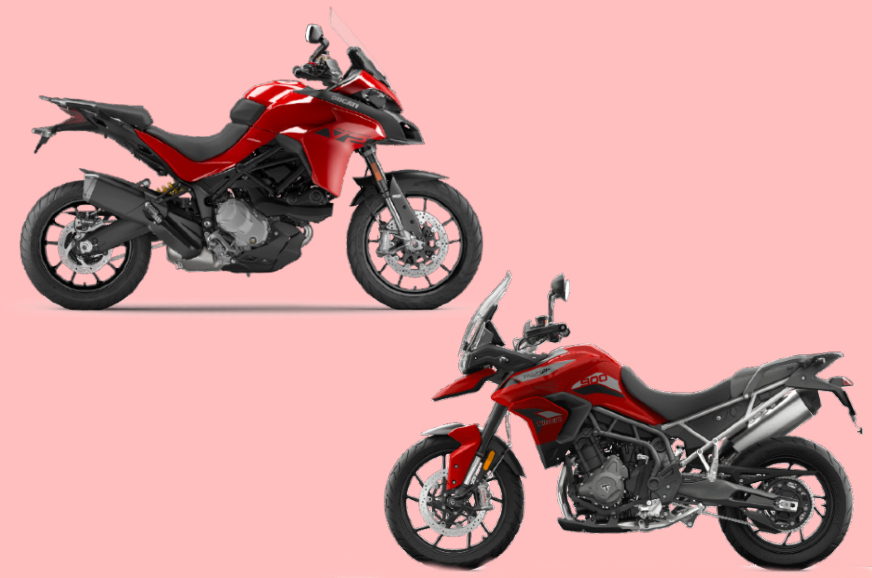
The Ducati Multistrada family of adventure tourers are often described as sportsbikes on stilts, owing to their zippy motors and sharp handling set-up. The latest in the line-up is the recently launched Multistrada V2, which is essentially an evolution of the Multistrada 950 that was on sale in India for a number of years.
But, when it comes to middleweight adventure tourers, the most popular bike in the segment had proven to be the venerable Triumph Tiger. A long time fan favourite in its 800cc guise, the brand made significant changes to the bike when it bumped up the displacement to create the Tiger 900 a couple of years ago. The GT variant of the Tiger 900 is the more street-oriented version that sits against the similarly road-focused Multi V2. So, how does Italian flair stack up against Brit brawn?
Ducati Multistrada V2 vs Triumph Tiger 900 GT: Engine and gearbox
| Engine and gearbox | ||
|---|---|---|
| Ducati Multistrada V2 | Triumph Tiger 900 GT | |
| Engine | 937cc, liquid-cooled, L-twin | 888cc, liquid-cooled, inline-triple |
| Power | 113hp at 9000rpm | 95.2hp at 8750rpm |
| Torque | 94Nm at 6750rpm | 87Nm at 7250rpm |
| Gearbox | 6-speed | 6-speed |
Ducati Multistrada V2 vs Triumph Tiger 900 GT: Underpinnings
| Underpinnings | ||
|---|---|---|
| Ducati Multistrada V2 | Triumph Tiger 900 GT | |
| Suspension (f) | 48mm USD fork, fully adjustable (170mm travel) | 45mm USD fork, adjustable compression and rebound damping (180mm travel) |
| Suspension (r) | Fully adjustable monoshock (170mm travel) | Monoshock, adjustable preload and rebound damping (170mm travel) |
| Tyre (f) | 120/70-ZR19 | 100/90-19 |
| Tyre (r) | 170/60-ZR17 | 150/70-R17 |
| Brakes (f) | Twin 320mm discs | Twin 320mm discs |
| Brakes (r) | 265mm disc | 255mm disc |
The Multistrada continues to have the upper hand in terms of specifications when we move into the chassis department. Its biggest advantage is in the area of suspension, where it offers fully adjustable units at both ends, giving you more scope to tune the ride and handling of the bike to your liking.
The Tiger, in comparison, is only adjustable in two out of three parameters at each end. But it does offer slightly more travel at the front wheel, and while the Multi's chunkier tyres might give it an edge when it comes to on-road grip, the Tiger's more slender rubber should make it more manageable off-road. Overall, the Tiger seems to have a little more off-road focus than the Multi, even though this is the more road-focused GT variant of the big cat. The Ducati certainly has the credentials to be taken off-road itself, but while still making for a pretty engaging and capable road bike. We even found its predecessor, the Multistrada 950, to be loads of fun out on the racetrack! Both bikes have more expensive variants that offer fully adjustable electronic semi-active suspension.
Ducati Multistrada V2 vs Triumph Tiger 900 GT: Dimensions and weights
| Dimensions and weight | ||
|---|---|---|
| Ducati Multistrada V2 | Triumph Tiger 900 GT | |
| Seat height | 830mm | 810-830mm |
| Wheelbase | 1594mm | 1556mm |
| Dry weight | 199kg | 194kg |
| Fuel capacity | 20 litres | 20 litres |
Seat heights on both bikes are relatively accessible, considering the format of these motorcycles. But the Triumph goes a little bit further by offering you adjustable seat height that can be dropped as low as 810mm. As we mentioned earlier, it's also the slightly lighter bike here, and these two factors, combined with the friendlier engine nature, should make it the more manageable and approachable option of the pair.
Price and verdict
Considering it has the larger, more powerful engine and more sophisticated suspension hardware, it should come as no surprise that the Ducati is the more expensive motorcycle here. The margin seems to be quite proportionate, though – the Multi is under Rs 1 lakh costlier (Rs 14.65 lakh vs the Tiger's Rs 13.70 lakh)*, which is quite fair when you take it into account what it offers over the Tiger.
But that's not to say that the Triumph is an expensive or poorly equipped motorcycle in any way. Not at all. It's a well-rounded package in its own right, and both these motorcycles have very different characters when you ride them. So if you're conflicted between the two, the best thing to do would be to take a test ride. Check out our comparison review between the Tiger 900 GT and the Multistrada V2's predecessor to get an idea of the differing nature of the two motorcycles.*all prices ex-showroom, India
https://ift.tt/2R3qAv4



